The Astrological Keys to the Faust myth: Part 2
The author proposes here a few themes of historical figures who have a Faust myth. This gives us examples of how to detect a Faust myth in an astrological chart. Let's not forget that this is a gradient and that there are great and small Faust myths.
2/27/20247 min read
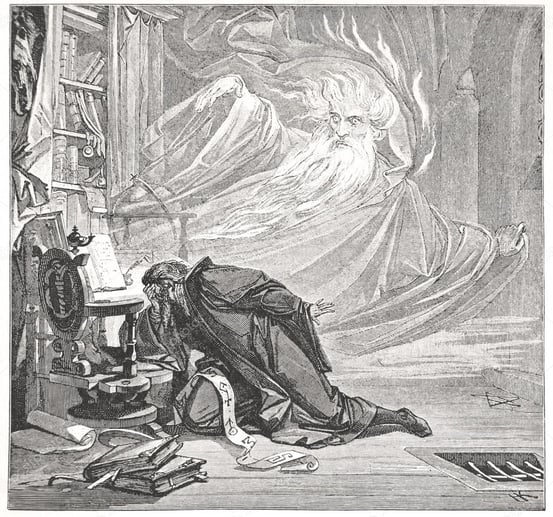

Signs in trine, Pisces and Cancer.
Cancer reminds Faust that he will go further in his creativity and exploration if he agrees to love himself. Pisces brings him faith and trust in the universe, which Faust will be able to discover at every moment of his journey.
Signs in square Leo and Aquarius, breaking patterns.
These are the two keys that will enable Faust not to let himself be invaded by pathology. With Leo, you have to keep coming back to your Sun, to the simplicity of your heart. Obviously, Leo and Aquarius are not easy for Faust, since they are in square with his representative sign, Scorpio, which requires him to go through a crisis of conscience, a change of perspective. Scorpio will tend to say that it's not very important for him to have a crisis of conscience. The paradox of being in control, in power, in the extreme, while saying he doesn't want to put himself first. There's a good example of a Faustian who refused to put himself forward: his name was Sartre and he refused the Nobel Prize.
So, to get back into the sunlight, put yourself in the limelight, to get out of the shadows.
The second key is given by the sense of myth, which is the humour of Aquarius. Remember when Faust meets the old man and tries to convert him, and the old man uses humour to get rid of Faust? Why humour in Aquarius? Because Aquarius always plays the game of paradox, always where you least expect it. This means that he have an innate ability to think differently and to position himselves on one plane or another, in one light and in another. This will disrupt Faust's obsessive fixation on a single point of view. Thus, the flexibility of points of view acquired in Aquarius and the recognition of the value of the I acquired in Leo are the two essential keys to emerging from the shadows of the Faustian myth.
The eyes of the Zodiac
It's very interesting to see the myth through the eyes of the Zodiac, because the great Faustian threat is madness. Nietzsche spent the last 11 years of his life in a psychiatric hospital. Jung went through a crisis of madness and came out of it because he was able to return to the earth; he built the Bollingen Tower at that time. He returned to concrete things, to the earth, to physical exercise and so on. Jung said that, at certain times, he was invaded by psychic forces that arose from his unconscious and disturbed his consciousness. Gérard de Nerval, who was a Faustian, also went mad and committed suicide. So if the Faustian adventure is not recuperated by bodily consciousness, it's complicated.
Astrological clues to the Faustian myth in certain historical Faustians
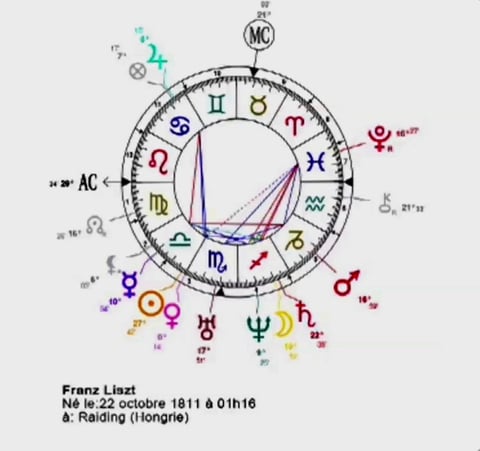

In what way was Franz Liszt a Faustian? First of all, he wrote a Faust and astrologically, he had a black moon in Virgo, so his whole life revolved around knowledge. As a reminder, the sign in which our mean black moon is found is the absolute that we carry within us, it's our essential quest, it's a quest for Virgoan perfection and knowledge. The Sun and Pluto are valued, the Sun through its domínio of the ascendant and Pluto through its conjunction to the lunar south node. We agree that this example of a theme is not immediately obvious, but if we examine Liszt's life, we will see that he was quite a Faustian.
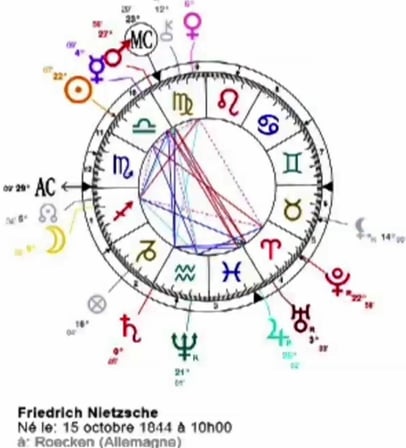

Nietzschehad an ascendant in Scorpio, which is a good indication that he was a Faustian, since Pluto is valued. The Pluto-Sun opposition is very important, as the Sun is in aspect with the ruler of the ascendant and the Sun-Pluto opposition therefore becomes a dominant in the theme. As the second ruler of the ascendant is Mars, Mercury is valued and forms part of the identity since they are conjoined. Unlike the first example, here we have a canonical Faust myth with a Sun-Pluto opposition due to the Scorpio ascendant, in a Mercurian setting, with the ruler of the ascendant in Virgo conjunct Mercury. He expressed the myth of Faust through personal creativity in the 5th house and through writing, because he had a Mercurian dominant, but to announce the new man, a new human cycle with Pluto in Aries.
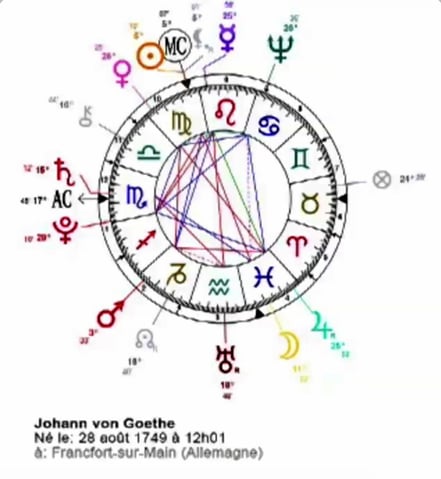

Goethe
We have two different ways with the same organisation as Nietzsche's. Pluto is important in Goethe's chart because it is the ruler of the ascendant, conjunct the ascendant and square the sun with the sun-mercury conjunction. Goethe was obsessed with Faust all his life; it took him 30 years to write his two Fausts. We can see that Pluto is in Scorpio and at the ascendant, so it was a quest for identity that he made through Faust.
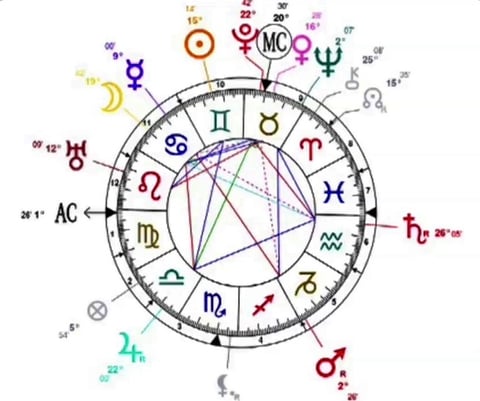

Thomas Mann, author of Doctor Faustus and winner of the Nobel Prize, was German.
Mercurial context with the ascendant in Virgo and the Sun in Gemini, Mercury being the ruler of the ascendant is in semi-square to Pluto, which makes a red aspect of Pluto to the ruler of the ascendant and thus reinforces Pluto. With a Mercurian context and a dominant Sun due to its position in the middle of the sky.
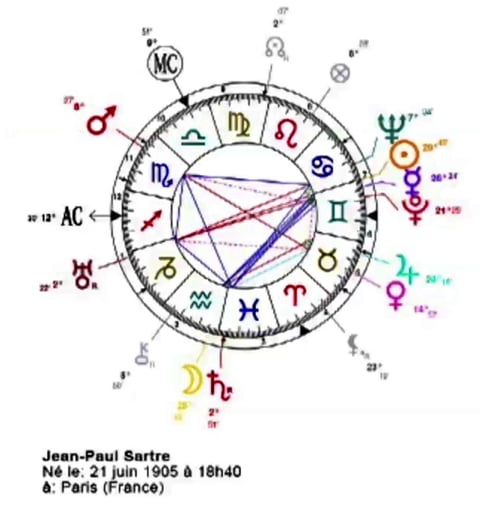

Jean-Paul Sartre
We have a planetary cluster with Pluto, the dominant of the cluster, which is the slowest, so Pluto is valued and over-valued because of its conjunction with the descendant. We can see that Sartre's Faust myth is expressed in the 7th house in Gemini mode. In the 7th house, we're not making anything up when we say that the hell is other people; we're talking about a Faust myth in the 7th house! The astral theme will tell us where and how the myth applies, with the 'where' the astrological house and how it applies, in Gemini mode, in other words through Sartre's incredible intellectual capacity. His biography tells us that at certain times he read 300 books a year. He produced a monumental body of work with a Faustian hyper creativity. He wrote a very interesting book called Being and Nothingness. It shows Mercury, the writing that lies exactly between being, the sun, and nothingness, Pluto. He really staged the myth through his writing and the question of relationships with others. Moreover, he found his way out through teaching, through Sagittarius. Sartre was a remarkable teacher and refused the Nobel Prize, in other words, he refused to be in the limelight and, in fact, he let his fame overtake him.
Richard Wagner
We can see just how creative the Faustians are. What makes Wagner a Faustian? The Gemini ascendant provides a Mercurian context, with the Sun in conjunction with the ascendant, hence the importance of Mercury and the Sun. The Black Moon in Scorpio is an indication of the Faustian myth. The Black Moon is in trine to Pluto, and an important position that is evident in his personality is the semi-square to Mercury, ruler of the ascendant. Semi-squares should not be overlooked, because if there had been no semi-square, Wagner would have had the basic myth of Faust, but as this semi-square affects the personality, because it affects the planet that rules the ascendant, it therefore affects identity. Another myth in Wagner's chart that certainly saved the day was Prometheus, with Uranus conjunct the Black Moon in Scorpio and opposite the Sun. Pluto in Pisces represents a fish theme, which revives the magical power of music.
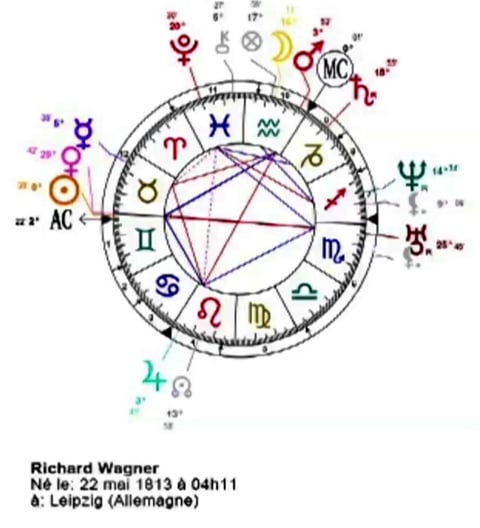

Faustian pathologies
There are undoubtedly others, but we can identify at least 3 Faustian pathologies. The first is heart disease, which is really a wound caused by the sun. Heart attacks are also a feeling of losing a territory, of letting go of a territory. The word "infarct" comes from a Latin word meaning "stuffed with", which would mean that we are stuffed with the past. The word "stuffed" designates the fact of being overloaded, stuffed with something: being stuffed with the past without being able to recycle it in a new state of consciousness. The heart attack is therefore the sign of the disease that says: it's time to metamorphose, to move into a new state of consciousness, but there's something in you that hasn't seen it, so I'm creating the heart attack to tell you.
The second pathology is probably a blood platelet problem and blood is linked to the Faust myth. Faust's belief system is that the world is dangerous, that the world is a battlefield, that the world is Darwinian, that either you eat me or I eat you. Since the world is dangerous, it needs to protect itself against any injury, so it will increase its platelets to help wounds heal. We can see how the system works. In fact, the increase in platelets is a shield that protects it against the dangers of a real event. So, in physiological terms, an above-average platelet count can be a sign of a Faustian myth.
A third pathology is blindness, which represents the sun veiling itself, the light veiling itself, and what blindness says in the language of birds, CESSE-I-T. A word that helps us to understand this is the word vérité vers-i-t, truth is vers-i-t, it's the incarnation of spirit in matter, how spirit becomes flesh. Blindness prevents us from going towards-i-t. Blindness is therefore an invitation to live the experience rather than to understand it. In other words, when we can no longer see, we are necessarily brought back to ourselves; when we can no longer see the light outside, we are obliged to return to our inner light.
Translated and adapted from Luc Bigé'shttps://reenchanterlemonde.com/mythologie/#faust by @SatyamAstro/Nicolas Roessli and supported by DeepL.com
Our Friend's Websites
Luc Bigé
https://reenchanterlemonde.com/
Jean-Yves Leloup https://elearning.jeanyvesleloup.eu/
Éric Fleury
Nicolas Roessli


